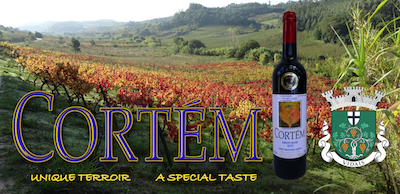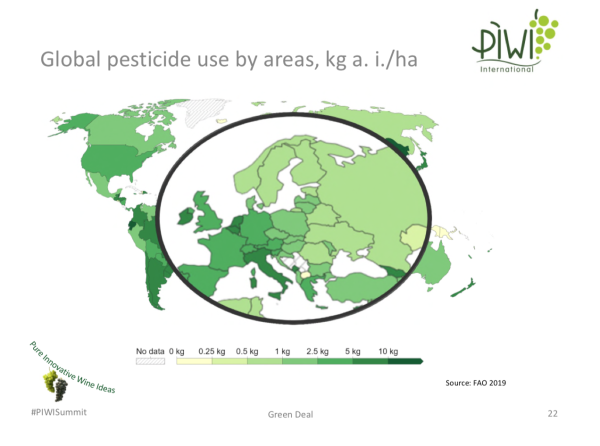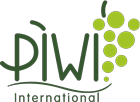PIWI Portugal
PIWI International has kindly invited me to represent them in Portugal to help inform wine growers and winemakers here about PIWI grape varieties, with the aim to increase confidence leading to planting and producing portuguese wines made from these vines.
In addition Portugal has one of the largest numbers of native varieties and research into breeding PIWI vines using these Autoctone varieties as part of a successful PIWI variety would be very important not only for Portugal.
I am an engineer by training having worked in heavy industry, but moving to film and television in the 70s as a sound engineer and later developing products for this industry in my company in Munich.
I and my wife Helga moved to Portugal and started an organic winery in 2001 called Vinhos Cortém. We were certified organic in 2010 and with 4.5 Ha. of vines and 16 different international and portuguese grape varieties, made organic wine until 2019 when we sold the winery. But we are continuing making wine on a small scale with about 2 Ha. In this way, we can continue our passion making wine in our terroir and remain in the wine community here. We welcome all Piwistas to visit us if they are in Portugal!
See details on www.wineeccentrics.com
ChristopherPrice
Rua João Alves 37-39
Cortem
2500-741 VIDAIS
Telemove: +351 912288586
E-mail: c.price@gmx.de
Internet: www.wineeccentrics.com

Latest News
Robust grape varieties – wines of the future 22.8.2024
content
Discover the world of wine in a whole new way!
This training is intended for anyone interested in viticulture, regardless of their knowledge or experience.
Learn about the hardy grape varieties and their advantages such as their resistance to different environmental conditions and diseases.
You will have the opportunity to learn more about the cultivation of these varieties, their characteristics and the resulting wines.
You will also have the opportunity to ask questions and expand your knowledge of viticulture.
Participants
Wine lovers
Course leader
Wagner-Yannick
date
22.08.2024 16:00 – 18:00Number of free places: see website
Costs
CHF 50.- per person
Location
still open, information to follow
Registration
Registration deadline: 27 July 2024
SKU265 – Excursion – robust grape varieties – 14.8.2024
content
Robust grape varieties are becoming increasingly important in your operations, whether to simplify certain work steps or to expand your product range.
Join us on a journey of discovery beyond national borders.
We will be intensively involved in research in the areas of vine breeding and oenology. In addition, we want to work with our German colleagues to increase the marketing of these robust varieties.
Participants
Full-time and part-time winemakers
Course leader
Wagner-Yannick
Speakers
Dr. Ramon Mira Heidinger, WBI Freiburg
Fabio Fehrenbach, WBI Freiburg
Dr. Ernst Weinmann, WBI Freiburg
Winemakers from the Freiburg i. Br. area
date
14.08.2024 07:30 – 21:30Number of free places: see website
Costs
CHF 250.- per person
Location
Surroundings, 79112 Freiburg im Breisgau
Registration
Registration deadline: 12 July 2024
2 PSM treatments are sufficient even in case of high disease pressure in Muscaris and Souvignier gris
«The Grangeneuve organic winery in the Dordogne is managed by the department's Chamber of Agriculture as part of the Dephy network.
In 2018, winemaker and owner Anthony Castaing planted the first resistant grape varieties: Muscaris and Souvignier gris.
In the last two vintages, 2022 and 2023, two copper and sulphur-based treatments were carried out on these vineyards. His overall indicator for the frequency of plant protection treatments is 1.56. "This is a great advance in plant protection and a reduction in workload, even in years with strong downy mildew pressure like 2023," he notes.
On the other hand, "it is no longer possible to go on holiday in the last two weeks of August". In 2022, for example, the Souvignier Gris was harvested on August 24, well ahead of the Sauvignon gris, the reference grape variety in the monitoring carried out by the CA24.
This "marked advancement of the phenological stages begins as soon as bud break occurs," says consultant Camille Delamotte during a webinar on the subject. In 2022 and 2023, Muscaris and Souvignier gris were in the "green point" or "leaf break" stage at the end of March. In 2022, the vines were affected by a spring frost on April 1. "This risk must be taken into account. These varieties are recommended for terroirs with little or no frost."
>>> Read also: First feedback on the resistant variety Souvignier gris»
Source: www.tema-agriculture-terroirs.fr
First feedback on the resistant variety Souvignier gris
First feedback on the resistant variety Souvignier gris
Its berries are pink, which is not very common among the most widely grown grape varieties in France. However, its greatest peculiarity is that it is resistant to powdery mildew and downy mildew. It has inherited this resistance from one of its relatives, the Bronner (the other is Cabernet Sauvignon). It is called Souvignier gris, one of the resistant varieties currently authorized in France.
The IFV can confirm that the Souvignier gris has at least one resistance gene against powdery mildew: Ren 3.
Spotlight on PIWI varieties by Edy Geiger
Since 2021, when many winegrowers were only able to keep fungal diseases under control with great difficulty, interest in PIWI vines has risen sharply. Especially because of the prospect of financial aid for new plants. PIWI pioneer Edy Geiger presents what he sees as the most promising varieties.
Source: Swiss magazine Obst + Wein April 2023
Cooperation with wein.plus: Benefit as a member of PIWI-International!
There is a cooperation between PIWI International and wein.plus that aims to promote the association and its members on wein.plus. In this webinar, which lasts no more than 10 minutes, Utz Graafmann will show how you as a winery can benefit from this.
Tuesday, February 14, 2023 at 6 p.m. (the webinar will be recorded)
Sell wine successfully with wein.plus for wineries
Find out how you, as a winery, can maximize your wine sales, find stockists across Europe and get support in the sales process. Learn methods to increase the visibility of your winery on wein.plus and increase your sales figures. Use wein.plus to bring additional visitors to your winery or to advertise events.
Language: German
Duration: 20 minutes
First Worldwide Online PIWI SUMMIT
 The Green Deal, the CRISPR-Cas technique and the resistance gene in the spotlight: Are we excited or not?
The Green Deal, the CRISPR-Cas technique and the resistance gene in the spotlight: Are we excited or not?
As PIWI representative in Spain, I was delighted to attend this first summit.
I took part with the aim of training myself, because resistant varieties are a new world that is opening up to us and I am convinced that it will represent the viticulture of the future.
I am happy to see this development:
- how the idea of crossing Vitis species with each other to make vines more resistant came about,
- in which countries these new varieties spread the most
- knowing that each new PIWI grape variety requires more than thirty years of research.
Climate change and the Green Deal are so topical and omnipresent that we now have to rethink and take the bull by the horns.
Although Spain's wine legislation does not yet provide for the cultivation of resistant varieties for commercial purposes, it is clear that this must change immediately.
PIWI International is represented and active throughout Europe and the response to these “NEW WINES” is spectacular, especially for their quality and sustainability; a must with regard to environmental protection and health.
With regard to the Green Deal, I was captivated by the lecture by Dr. Wolfgang Häussler, PIWI winemaker and EU advisor.
The F2F strategy (Farm to Fork) and the strategy to promote biodiversity for sustainable food production envisage a reduction in the use of pesticides by 50 % by 2030.
In order to achieve these goals, the following measures are required in the wine sector, among others:
- provide for the use of products and techniques to minimize toxicological and ecological risks,
- to keep the soil organically active and to promote biodiversity
- start the transition from growing traditional grape varieties to growing resistant varieties.
Opinions are divided on one topic: the CRISPR-CAS9 technique, which the EU considers suitable for speeding up the breeding of resistant varieties.
Some organic winegrowers do not find this “natural”, while the proponents consider it acceptable because no genetic modification per se takes place, but only the improvement of the resistant properties is worked out, which otherwise takes years of breeding.
I will not go into any more detail as all the presentations explaining these issues can be found in the members area of the PIWI International website.
The role of PIWI International in terms of communication and lobbying was explained in further presentations: With almost 1000 members in 30 countries, PIWI International is one of the largest international winegrowers' associations.
In order to strengthen the lobbying character of the association and to facilitate the exchange of knowledge between winegrowers, researchers and politicians in the wine sector, a comprehensive internal and external communication strategy has already been initiated.
Another incredible talk was given by Vitalie Popa, the Moldovan inventor of barrels that allow the winemaking and aging process to be completely free of preservatives and additives.
And last but not least, the lecture by Remo Räz from the biodynamic winery LENZ in Switzerland, who reported on their experiences with 12 PIWI red wine varieties and went into vinification and marketing of these PIWIs.
This case clearly showed us that PIWI brings about a drastic reduction in pesticide treatments, eliminates the need for copper and greatly reduces fuel consumption compared to traditional varieties.
The world is changing and it is time to act and bring nature back into our lives.
Together we can do anything.
We therefore invite you to actively participate in our community by sharing information and contributing your knowledge or experience.
Click here for the podcast with Wolfgang Häußler and Diego Weber (German)
Become a member: https://piwi-international.org/der-verein/mitglied-werden/
Karin Lundberg – PIWI Spain in January 2023
PS: Oh yes, I almost forgot to mention that the PIWI SUMMIT will take place quarterly. So make a note of the next date in your agenda: April 17, 2023 at 6:00 p.m.
PIWI is developing into a quality mark - PIWI Wine Challenge 2022
High level at the PIWI International Wine Challenge 2022

Gone are the days when PIWI vines were grown primarily for environmental reasons. There are now many very good wines made from PIWI varieties, as well as numerous internationally committed winegrowers who can draw on a lot of experience with PIWIs both in viticulture and in winemaking and who bottle the best wines, which the PIWI International Wine Challenge 2022 has fully confirmed . Two thirds of the wines received SILVER or GOLD, even TOP GOLD. The high quality was generally confirmed by the visitors at the subsequent public tasting, for which all the wines were presented according to the blind evaluation. The PIWI mark, which PIWI members are allowed to put on the labels of their wines, can be considered something of a quality mark. And so PIWI wines bring environmental protection and enjoying good wines together and can be considered an important future of wine.
Divico wines blended with Pinot noir - good quality and intense colour
Divico, Agroscope's new disease-resistant grape variety, is valued for the quality of the wines made from it. Assemblage trials with the Pinot noir variety have shown that Divico is suitable for correcting color intensity.
With an area of almost 3900 ha in 2020, Pinot noir is the most commonly cultivated variety in Switzerland. It is widespread in all wine-growing regions north of the Alps. The good reputation is based on the fine and typical bouquet of its wines, which is characterized by fruity notes and a good structure as well as very delicate and velvety tannins. Visually, the color intensity is sometimes judged to be a bit weak. Dyer grapes such as Dakapo and Dunkelfelder are therefore cultivated in Switzerland, and their wines are used in low-percentage blends to improve the color of Pinot noir. With the first red grape variety developed by Agroscope and approved in 2013, which is resistant to downy mildew and powdery mildew as well as gray mold, another variety is available that is suitable for this purpose.
How, please, does VB Cal 1-28 taste? (Article Hotelrevue)
On February 10th, an article by Mischa Stünzi was published in the Hotelrevue. In it he refers to the difficult wine year 2021 in Switzerland and why PIWIs are still having a hard time in gastronomy.
Also an interview with Valentin Blattner (in French)
Mischa Stünzi is the editor of Hotelrevue – www.htr.ch.

